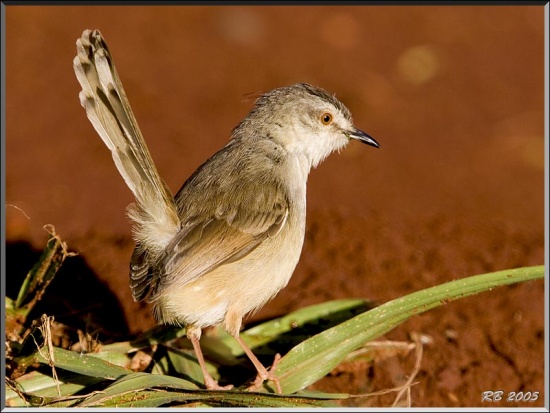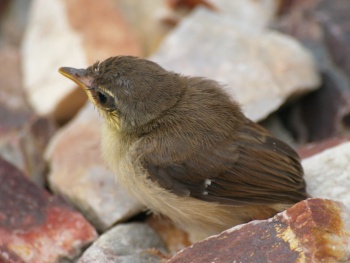m (→Subspecies: Changed Swaziland to eSwatini) |
|||
| (7 intermediate revisions by 6 users not shown) | |||
| Line 1: | Line 1: | ||
| − | {{ | + | [[Image:Tawny-flanked_Prinia.jpg|thumb|550px|right|Photo © by {{user|rudydbn|rudydbn}} <br />Illovo Glen, [[South Africa]], January 2006]] |
;[[:Category:Prinia|Prinia]] subflava | ;[[:Category:Prinia|Prinia]] subflava | ||
| − | |||
==Identification== | ==Identification== | ||
| − | + | 11–12 cm (4¼-4¾ in) | |
| + | *Greyish-brown upperparts | ||
| + | *Rufous-brown edges to the flight feathers | ||
| + | *Rufous tinge to the rump | ||
| + | *White throat and breast | ||
| + | *Buff flanks and vent | ||
| + | *White stripe over the eye | ||
| + | *Dark [[Topography#Heads|lores]] | ||
| + | *Long graduated [[Topography#Tails|tail]] | ||
| + | *White tipped tail feathers and a dark [[Dictionary_P-S#S|subterminal]] band | ||
| + | *Long slender bill<br /> | ||
| + | Sexes similar<br /> | ||
| + | [[Image:Tawny Flanked Prinia chick 2 - Copy.JPG|thumb|350px|right|Fledgling<br />Photo © by {{user|whiteheadedvulture|whiteheadedvulture}}<br />Accra, [[Ghana]], September 2015]] | ||
| + | '''Non-breeding adults''': longer tail than breeding birds<br /> | ||
| + | '''Juveniles''' | ||
| + | *Pale yellow underparts and bill. | ||
| + | ==Distribution== | ||
| + | [[Africa]] south of the Sahara<br /> | ||
| + | '''Western Africa''': [[Mauritania]], [[Senegambia]], [[Senegal]], The [[Gambia]], [[Guinea-Bissau]], [[Guinea]], [[Mali]], [[Sierra Leone]], [[Liberia]], [[Ivory Coast]], [[Burkina Faso]], [[Ghana]], [[Togo]], [[Benin]], [[Nigeria]], [[Niger]], [[Chad]], [[Cameroon]], [[Central African Republic]], [[Equatorial Guinea]], [[Gabon]], [[DRC]] and [[Angola]]<br /> | ||
| + | '''Eastern Africa''': [[Sudan]], [[Eritrea]], [[Ethiopia]], [[Somalia]], [[Kenya]], [[Uganda]], [[Rwanda]], [[Burundi]], [[Tanzania]], [[Zambia]], [[Mozambique]] and [[Malawi]]<br /> | ||
| + | '''Southern Africa''': [[Namibia]], [[Botswana]], [[Zimbabwe]], [[South Africa]], [[KwaZulu-Natal]], [[Lesotho]] and [[eSwatini]] | ||
| − | |||
| − | |||
==Taxonomy== | ==Taxonomy== | ||
| + | ====Subspecies==== | ||
| + | Ten subspecies are recognized<sup>[[#References|[1]]]</sup>: | ||
| + | *''P.s. subflava'': [[Senegal]] to western and central [[Ethiopia]] and northern [[Uganda]] | ||
| + | *''P.s. pallescens'': [[Mali]] to [[Sudan]], northwestern [[Ethiopia]], and western [[Eritrea]] | ||
| + | *''P.s. melanorhyncha'': [[Sierra Leone]] to [[Cameroon]], northern [[Zaire]], [[Kenya]] and north-western [[Tanzania]] | ||
| + | *''P.s. graueri'': Eastern [[Zaire]] (Kivu) to [[Rwanda]] and highlands of [[Angola]] | ||
| + | *''P.s. affinis'': Eastern [[Zaire]] to south-western [[Tanzania]], [[Zambia]], eastern [[Botswana]] and southern [[Mozambique]] | ||
| + | *''P.s. bechuanae'': South-western [[Angola]] to northern [[Namibia]], northern [[Botswana]], south-western [[Zambia]], western [[Zimbabwe]] | ||
| + | *''P.s. mutatrix'': Southern [[Tanzania]] to [[Malawi]], eastern [[Zambia]], eastern [[Zimbabwe]] and [[Mozambique]] | ||
| + | *''P.s. kasokae'': Western [[Zambia]] (west of Zambezi River) and adjacent eastern [[Angola]] | ||
| + | *''P.s. tenella'': Coastal eastern Africa ([[Somalia]] to southern [[Tanzania]]) | ||
| + | *''P.s. pondoensis'': Southern [[Mozambique]] to [[Natal]], eastern [[eSwatini]] and eastern Cape Province | ||
| + | |||
==Habitat== | ==Habitat== | ||
| − | + | Scrub, rank grass, weeds or bushes among scattered trees, usually along streams and sewage ponds; gardens, edges of old cultivated lands; more arboreal in winter than in summer. | |
| − | |||
==Behaviour== | ==Behaviour== | ||
| − | The diet | + | ====Diet==== |
| − | + | The diet consists mainly of insects and other invertebrates, such as mayflies, beetles and their larva. | |
| − | A purse-shaped nest is made of strips of grass woven together. 2-4 eggs | + | ====Breeding==== |
| − | + | A purse-shaped nest is made of strips of grass woven together. The 2-4 eggs usually have brown or purple spots or blotches. There may be a second brood. | |
| + | ==References== | ||
| + | #{{Ref-Clements6thAug17}}#Avibase | ||
| + | #Handbook of the Birds of the World Alive (retrieved February 2016) | ||
| + | #Wikipedia | ||
| + | #BF Member observations | ||
| + | {{ref}} | ||
==External Links== | ==External Links== | ||
{{GSearch|Prinia+subflava}} | {{GSearch|Prinia+subflava}} | ||
| − | [[Category:Birds]] [[Category:Prinia | + | [[Category:Birds]] [[Category:Prinia]] |
Latest revision as of 09:41, 15 November 2021
- Prinia subflava
Identification
11–12 cm (4¼-4¾ in)
- Greyish-brown upperparts
- Rufous-brown edges to the flight feathers
- Rufous tinge to the rump
- White throat and breast
- Buff flanks and vent
- White stripe over the eye
- Dark lores
- Long graduated tail
- White tipped tail feathers and a dark subterminal band
- Long slender bill
Sexes similar
Non-breeding adults: longer tail than breeding birds
Juveniles
- Pale yellow underparts and bill.
Distribution
Africa south of the Sahara
Western Africa: Mauritania, Senegambia, Senegal, The Gambia, Guinea-Bissau, Guinea, Mali, Sierra Leone, Liberia, Ivory Coast, Burkina Faso, Ghana, Togo, Benin, Nigeria, Niger, Chad, Cameroon, Central African Republic, Equatorial Guinea, Gabon, DRC and Angola
Eastern Africa: Sudan, Eritrea, Ethiopia, Somalia, Kenya, Uganda, Rwanda, Burundi, Tanzania, Zambia, Mozambique and Malawi
Southern Africa: Namibia, Botswana, Zimbabwe, South Africa, KwaZulu-Natal, Lesotho and eSwatini
Taxonomy
Subspecies
Ten subspecies are recognized[1]:
- P.s. subflava: Senegal to western and central Ethiopia and northern Uganda
- P.s. pallescens: Mali to Sudan, northwestern Ethiopia, and western Eritrea
- P.s. melanorhyncha: Sierra Leone to Cameroon, northern Zaire, Kenya and north-western Tanzania
- P.s. graueri: Eastern Zaire (Kivu) to Rwanda and highlands of Angola
- P.s. affinis: Eastern Zaire to south-western Tanzania, Zambia, eastern Botswana and southern Mozambique
- P.s. bechuanae: South-western Angola to northern Namibia, northern Botswana, south-western Zambia, western Zimbabwe
- P.s. mutatrix: Southern Tanzania to Malawi, eastern Zambia, eastern Zimbabwe and Mozambique
- P.s. kasokae: Western Zambia (west of Zambezi River) and adjacent eastern Angola
- P.s. tenella: Coastal eastern Africa (Somalia to southern Tanzania)
- P.s. pondoensis: Southern Mozambique to Natal, eastern eSwatini and eastern Cape Province
Habitat
Scrub, rank grass, weeds or bushes among scattered trees, usually along streams and sewage ponds; gardens, edges of old cultivated lands; more arboreal in winter than in summer.
Behaviour
Diet
The diet consists mainly of insects and other invertebrates, such as mayflies, beetles and their larva.
Breeding
A purse-shaped nest is made of strips of grass woven together. The 2-4 eggs usually have brown or purple spots or blotches. There may be a second brood.
References
- Clements, J. F., T. S. Schulenberg, M. J. Iliff, D. Roberson, T. A. Fredericks, B. L. Sullivan, and C. L. Wood. 2017. The eBird/Clements checklist of birds of the world: v2017, with updates to August 2017. Downloaded from http://www.birds.cornell.edu/clementschecklist/download/
- Avibase
- Handbook of the Birds of the World Alive (retrieved February 2016)
- Wikipedia
- BF Member observations
Recommended Citation
- BirdForum Opus contributors. (2024) Tawny-flanked Prinia. In: BirdForum, the forum for wild birds and birding. Retrieved 23 May 2024 from https://www.birdforum.net/opus/Tawny-flanked_Prinia





